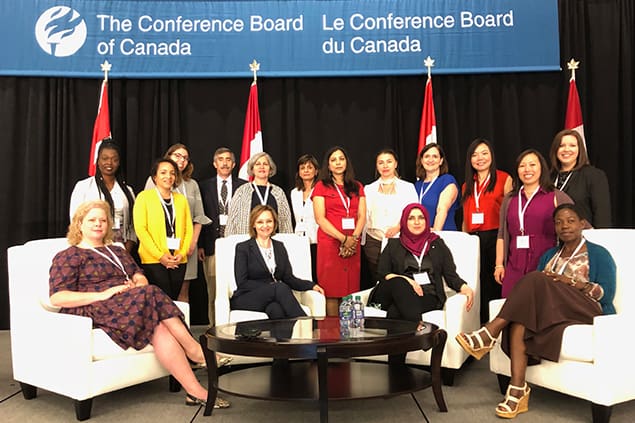Digitization, cross-sector collaboration, and innovation are going to drive how Canada approaches immigration going forward. Those factors and others influencing the immigration process were among the key topics of discussion at “Strengthening Our Economy and Settlement Program,” a Conference Board of Canada summit held in May in Ottawa.
The annual conference is an opportunity to discuss “innovative, practical, and actionable solutions” to strengthen Canada’s immigration system. This year the focus was growing Canada’s immigration streams, and improving settlement services.
Ahmed Hussen, minister of Immigration, Refugees and Citizenship Canada, spoke on IRCC initiatives designed to decrease wait times and attract the best minds. A key component to creating a more welcoming Canada is to address how the country offers settlement services, he said, adding that representatives from his office are meeting community organizations to learn and assess what is working well, and what changes are needed in the system.
Ten delegates who would not otherwise have had the opportunity to attend such a high profile convening were sponsored by WES Global Talent Bridge. They shared some of the observations they took from the conference and will now incorporate into their work.
Digitization Will Change How We Prepare Immigrants for Success
“With one colleague, I talked about how artificial intelligence could help take the non-profit, in particular the settlement sectors, into new and exciting frontiers that would make our work more efficient and effective.”
– Bayan Khatib, Executive Director, Syrian Canadian Foundation
Canada needs to address disrupting technologies and the effect this will have on future immigration to Canada, explained Sunil Johal, policy director at the Mowat Centre, who spoke about immigration in the age of automation.
Johal pointed to digitization as a factor shaping the future of the workforce with a particular focus on how this will affect the skills Canada will need to move the economy forward. There will be a long period of uncertainty and an increased pace of change. Canada will need talent that is flexible and responsive with high levels of social and emotional intelligence, he said.
“I learned a plethora of things at the conference,” says Georgette Morris, PhD candidate at the University of Ottawa. A key takeaway for her was that artificial intelligence will “grossly affect” the future of business and immigration priorities.
.@JohalSunil asks: How do we ensure skilled immigrants have access to skills training to adapt to new job economy? Settlement and employment sector will need to adapt to higher value on emotional intelligence and soft skills. #immigration2018
— WES Canada (@WESCanada) May 30, 2018
Cross-Sector Collaboration Will Improve Immigrant Integration
Another theme that emerged from the summit was the need for integration beyond the settlement sector in order to be competitive in a global competition for talent.
Ximena Munoz from the Office of the Manitoba Fairness Commissioner spoke about creating equality in regards to access to regulated professions. Munoz recommended three improvements: supervised practical opportunities; recognition of work experience; and timely registration. Opening the sector beyond social services to include employers and regulatory bodies will serve to improve the rate at which immigrants are able to work in regulated fields.
Dr. David Crawford, partner at Fragomen Global, pointed to employer consultation as a necessary improvement to Canada’s immigration system to attract talent that aligns with the needs of business. Those on the frontline of immigrant employment echoed this sentiment: cross-sector collaboration with private and public employers is a critical piece to successful professional immigrant integration.
.@JohalSunil asks: How do we ensure skilled immigrants have access to skills training to adapt to new job economy? Settlement and employment sector will need to adapt to higher value on emotional intelligence and soft skills. #immigration2018
— WES Canada (@WESCanada) May 30, 2018
Innovation Critical to Succeeding in Global Competition for Talent
The demand for talent in Canada, particularly in the Atlantic region, is great. To strengthen the country’s edge in the global competition for talent, improving and expediting the skills integration process of newcomers will be necessary.
Other countries, such as Australia, are also top destinations for immigrants, and the competition for talent is growing. Dr. Lesleyanne Hawthorne of the University of Melbourne shared some innovative Australian programs that are helping to attract talent. She referred to an impressive infrastructure for internationally educated nurses to bridge their experience, which results in high rates of immigrants attaining licenses as RNs.
The Atlantic Immigration Pilot is a creative approach that looks to address labour market challenges in eastern Canada. Tracey Taweel, chief executive officer at the Nova Scotia Office of Immigration, touted the benefits of the pilot. As the first province to open an Express Entry stream, Nova Scotia has maintained their innovation with this new pilot as they look to attract more newcomers.
The session helped practitioners like Pony Huang, coordinator for the Next Stop Canada pre-arrival program at the YMCA of Greater Toronto, to understand the needs of the region and provide pre-arrival immigrants with “personalized information and orientation that better suits their needs.”
Paul Feltman, deputy executive director, Global Talent Policy and Programs, and director, Global Talent Bridge Program at WES, discussed social innovation for economic integration. Feltman pointed to local examples of states and community organizations that are driving immigrant integration in the United States – organizations like the Welcoming Center for New Pennsylvanians. Projects like IMPRINT are setting forth an agenda to raise the profile of immigrant talent and improve immigrant professional integration through meaningful discussion and research.
.@JohalSunil asks: How do we ensure skilled immigrants have access to skills training to adapt to new job economy? Settlement and employment sector will need to adapt to higher value on emotional intelligence and soft skills. #immigration2018
— WES Canada (@WESCanada) May 30, 2018
Moving Forward
Service providers “need to articulate the settlement need of the hour through the right channels and in a pragmatic manner in order for it to yield results,” said Subhadra Ramachandran of the Halton Catholic District School Board, pointing to the need for such a conference in the sector. The Canadian Immigration Summit provided much needed time for an ever changing sector to reflect and inform a strategy that will best serve the newest Canadians.
*WES Global Talent Bridge operates in Canada and the United States. For country-specific terms such as labour/labor and license/licence, it is our policy to use spellings that align with the origin or source of the information.



